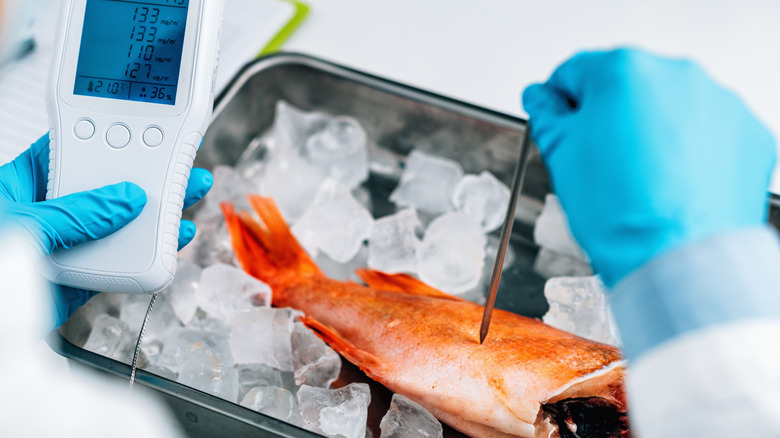When You Eat Too Much Salmon, This Is What Happens
Many health experts recommend adding fish to your meals once or twice a week. This protein is a relatively affordable way to get high-quality nutrients into your diet. "Fish is a high-quality, lean protein to add to your eating routine for healthy muscles, bones, tissue, and skin," said Valerie Agyeman, RD, a women's health dietitian (via Good Housekeeping). Salmon is widely known as one of the healthiest types of fish. It is a great source of omega-3 fatty acids, calcium, and protein (via Everyday Health).
While it's recommended that you eat about 8 ounces of salmon per week, you don't want to eat much more than that. According to Harvard Health Publishing, eating too much salmon can put you at risk of developing mercury poisoning. Most types of seafood contain trace amounts of mercury and some options are worse than others. Imported swordfish, imported marlin, shark, tilefish, king mackerel, bluefin tuna, and bigeye tuna steaks are all known to be high in mercury (via WebMD). While salmon is pretty low in mercury, people who consume large amounts of salmon each week have been found to have higher-than-normal mercury levels.
Should you be worried about mercury poisoning?
Although it's important to be aware of the dangers of mercury poisoning, the average person doesn't need to worry too much about this issue. According to the FDA, children under the age of three should eat about two ounces of fish per week, children under the age of 10 should eat four to six ounces per week, and children 11 years and older should eat about eight ounces per week. As long as you stay within the recommended weekly intake and choose low-mercury types of fish, you shouldn't have a problem with mercury poisoning.
According to Keck Medicine of USC, halibut, grouper, mahi-mahi, albacore tuna, and canned tuna are all considered low-mercury fish. Although many types of tuna are high in mercury, canned tuna is typically low and should be safe for most people to eat. "Tinned tuna is a very low source of mercury, so people would have to be eating at least three cans a day for about six months before it really became a concern," said Melanie McGrice, an accredited practicing dietitian (via Vice). If you're concerned about how much fish you should be eating, speak with your doctor.


